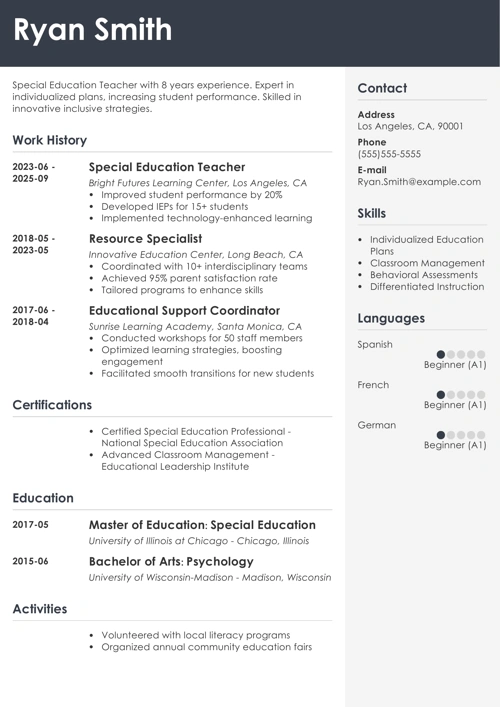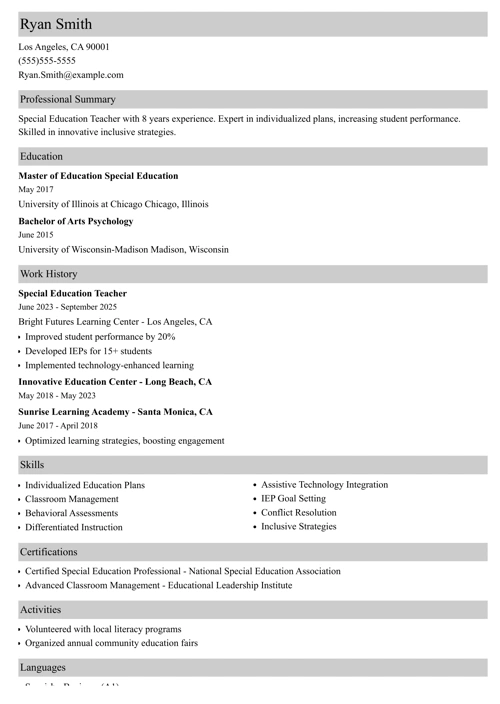Time management skills are precious, both in the workplace and in our everyday lives. And you came to the right place to learn all you need to know about them. So let’s not waste any time and get straight to the point!
This guide will show you:
- What are time management skills and a list of the best time management skills examples.
- How to put time management skills on a resume to impress recruiters and land more jobs.
- How to describe your good time management skills during job interviews and how to answer time management interview questions.
- Expert tips on how to improve your time management skills—starting today!
Want to present your time management skills on a resume the best way possible?
Want to save time and have your resume ready in 5 minutes? Try our AI resume builder. It’s fast and easy to use. Plus, you’ll get ready-made content to add with one click. See 20+ resume templates and create your resume here.
Sample resume made with our builder—See more resume examples here.
Looking for different skills sets to add to your resume? See:
- Conceptual Skills Examples
- Transferable Skills Examples
- Organization Skills Examples
- Hard Skill Examples
1. Time Management Skills Examples
Time management skills are skills connected with the process of planning and organizing one's activities in order to enhance performance, maximize productivity, and increase efficiency. They allow you to work smarter and get complete more tasks in less time.
Time management at work is indispensable. In fact, a recent LinkedIn study revealed that time management is one of the top-five most in-demand soft skills.
And what makes time management even more important?
It’s a transferable skill.
It means it can be applied across all industries and positions. No matter what your job is, being good at time management will greatly improve your hireability.
Without further ado then, let’s have a look at the most important time management skills examples.
(If you’re more interested in how to improve your time management skills, scroll down to see the best tips!)
Here is a list of the most important time management skills:
- Prioritizing
- Delegation
- Decision-making
- Goal setting
- Multitasking
- Problem solving
- Strategic thinking
- Scheduling
- Managing appointments
- Record keeping
Need more examples of time management skills? Here are some less popular (yet crucial!) abilities related to time management:
- Organization and filing
- Meeting deadlines
- Self-awareness
- Stress management and coping
- Strategic planning
- Effective teamwork
- Documentation
- Assessment and evaluation
- Office management and maintenance
- Stock inventory
- Resource management
The thing is—
Generic skills lists should only work as a point of reference.
It’s not enough to list your time management skills in the skills section of your resume or to simply say “I’m great at time management” during a job interview.
You need to prove you have these skills. Ideally, by providing examples of how you applied them.
Let’s see how you can do it.
First, we’ll walk through listing your time management skills on a resume.
(If you’re more interested in how to answer time management interview questions, move on to the next section.)
2. How to Put Time Management Skills on a Resume
The job ad requires candidates to be good at time management.
Like I said, putting “Time Management” in your resume skills section won’t do.
Sure, listing a few time management resume keywords amongst your skills could help you pass the ATS scan.
But once human beings start reviewing your resume—they’ll be looking for proof.
You’ll need to provide real-life examples of your time management skills.
The best place to do it?
Descriptions of your past jobs and achievements in the work experience section.
Check out these examples of time management skills described on resumes.
Time Management Skills—Resume Examples
Secretary
- Piloted a new appointments booking system which increased office efficiency by 15%.
- Commended by 2 supervisors for meticulous record-keeping.
Executive Assistant
- Managed busy schedules and travel plans of 3+ corporate executives while performing general office administration duties.
- Designed a new system of internal communication between assistants to save 4 work hours a week on average.
Project Manager
- Managed the highly successful Lean Training project for three years. Improved quality by 32%, cut lead times 21%, cut costs 48%.
- Scrum Master for 15 products, completed an average of 10% under budget, staying within deadlines for every project.
Software Engineer
- Optimized beta-testing workflow to double the Timely Project Delivery scores.
- Assisted in re-prioritizing the Software Development Roadmap to complete all critical projects on time.
While time management skills are crucial, you shouldn’t forget about other skills. Our detailed analysis of 11 million resumes created in our builder has shown that these are the top 10 most frequently added skills overall:
- Teamwork and Collaboration
- Problem-solving
- Excellent Communication
- Multitasking
- Attention to Detail
- MS Office
- Analytical and Critical Thinking
- Data Entry
- Project Management
- Team Management
Making a resume with our builder is incredibly simple. Follow our step-by-step guide, use ready-made content tailored to your job and have a resume ready in minutes.
When you’re done, our AI resume builder will score your resume and our resume checker will show you exactly how to improve it.
For great tips on how to put any skills on your resume, see: Skills Employers Want and How to Present Them on a Resume
3. Sample Time Management Interview Questions & Answers
Congratulations!
You nailed the descriptions of your time management and prioritization skills on your resume.
You made it to the interview. Now, employers will most likely want to ask more detailed questions on how well you manage your time. And it will get trickier.
Interview questions on time management usually fall into the category of situational interview questions.
Let’s go through some examples of time management interview questions and see good and less-than-perfect answers.
1. Tell me about a time your workload was very heavy.
This question focuses mostly on your prioritization skills. See these sample answers. What’s the main difference between them?
| right |
|---|
| We had three big orders at the same time. I delegated the least complicated one to the assistant lead and rescheduled less urgent tasks to handle the other two. We got both orders shipped on time and landed $200,000 in repeat business. The assistant lead turned out to be a capable leader and was later commanded by upper management. |
| wrong |
|---|
| We had a couple big orders come in at the same time. I worked overtime and we got everything done. |
The first answer shows two great time-management skills: prioritization and delegation. (It actually shows general management skills, too!)
The second answer? Well, “working overtime,” might show dedication, but actually it’s the exact opposite of effective time management in the workplace.
2. Tell me about a long-running project you handled. How did you manage your time to meet your deadlines?
| right |
|---|
| My team had to develop a SaaS application for a major client. We used the Agile SLDC model with 2-week sprints and daily standups/scrums. By delegating time management, we were able to finish the project 20% ahead of time. |
| wrong |
|---|
| We had to develop a SaaS app for a big client. It took a year to get all the kinks worked out. I kept myself on a strict schedule the entire time. |
The right answer shows project management and effective teamwork.
The wrong one? It’s far too unspecific, thus, hardly believable.
3. Describe a time when you had too many to-do items on your list. How did you solve the problem?
| right |
|---|
| Our department downsized and I got twice my normal workload. I found ways to do things quicker by sourcing new transcription software and making a new system for sorting interviews. I was able to do twice the work with the same effort. |
| wrong |
|---|
| During the holiday rush, I had a lot more to-dos than normal. Since that would mean working overtime every day, I convinced my supervisors that some of the tasks cannot be completed within deadlines and they agreed with my reasoning. |
The right answer is a perfect example of problem-solving, coping, as well as creative thinking.
The wrong answer isn’t actually awful. Sometimes it’s necessary to give some projects up and it’s good to realize it when the time comes.
But the answer sounds as if the candidate showed no initiative at all, which might be a red flag for hiring managers.
To get ready for every interview that might be ahead of you, make sure you read: Common Job Interview Questions and the Best Answers
4. How to Improve Time Management Skills? 3 Top Tips
I hate to break this to you:
To get better at time management requires both time and practice. But—
There are things you can start doing today to get better at managing your time. And it all starts with prioritizing.
1. Understand the Difference Between Urgent and Important
Urgent things require your immediate attention. But just because something is urgent, doesn’t mean it’s important.
Doing things that seem urgent but are actually of little significance costs us all a lot of time.
You should always focus on what’s important: starting with urgent issues, and following with less urgent ones.
For things that are urgent, but not important: try and delegate if there’s someone who can do them for you. If not, come back to them later (if necessary at all).
Things that are neither urgent nor important? Ignore them. Or save them for last if they’re your guilty pleasures like playing video games.
Use a priority matrix like this one, to keep tasks organized:
Here are some practical examples to help you see the difference:
Urgent and Important Tasks: Do Now
- Tax deadline.
- Sudden work crisis.
- Phone call from a strategic client.
Not Urgent but Important Tasks: Do Next
- Exercising
- Long-term planning
- Learning new skills
Urgent but Not Important Tasks: Do Later (If Still Necessary) or Delegate
- Phone call from a telemarketer.
- Most emails.
- Requests for favors from coworkers.
Not Urgent and Not Important Tasks: Ignore
- Browsing social media.
- Playing video games.
- Binge-watching TV series you’ve already seen 8 times.
2. Do Difficult Work When You Know You’re Most Productive
All of us have certain times of day when we’re most productive. Schedule difficult tasks that require full focus for these times, if possible.
Personally, I’m the exact opposite of a morning person. I know I can’t write for the first 2 to 3 hours after waking up. So I fill this time with smaller tasks such as replying to emails, taking care of the proper documentation of my work and so on.
The priority matrix from the previous section also helps here: if you have a list of smaller, non-urgent but important tasks, you can always pick from them when you have a moment of spare time, but feel unable to do anything complex.
3. Stick to a Schedule and Don’t Miss Deadlines
Keith Wilcox, a researcher out of Columbia University, analyzed half a million tasks entered into a popular to-do list app to check the users’ behaviour.
He found that when they changed the deadline for a task, it took them an average of 16 more days to complete the task than when they kept the original deadline.
Missing deadlines is not a once in a while occurrence either—users changed deadlines on 51% of tasks.
Creating a schedule for your whole week, in turn, helps you save time you’d spend deciding what task to do next.
It’s best to use a to-do list to schedule out everything we’re going to do each week (and day) into our calendar and then just let the calendar direct us.
A calendar itself can be your most important productivity tool. You can use it to measure the value of your work time so that you can make the most of your working hours.
Want to learn more about getting better at managing your time and priorities? Read our article with insider hacks from professional project managers (plus, a list of the coolest time management and productivity apps!): How to Manage Your Life Like a Professional Project Manager (Insider Tips)
Plus, a great cover letter that matches your resume will give you an advantage over other candidates. You can write it in our cover letter builder here. Here's what it may look like:
See more cover letter templates and start writing.
Key Takeaway
Here’s a recap of the most important points about time management skills:
- Time management skills are amongst the 5 most desired soft skills on today's job market.
- Examples of time management skills include: prioritizing, organization, delegation, strategic planning, and problem solving.
- To show off your time management skills on a resume, don’t just list them: back them up with real-life examples.
- To improve your time management skills: focus on the most important tasks and ignore those that are urgent but not vital to complete. Do difficult work when you feel most productive, and create a schedule and stick to it.
About Zety’s Editorial Process
This article has been reviewed by our editorial team to make sure it follows Zety's editorial guidelines. We’re committed to sharing our expertise and giving you trustworthy career advice tailored to your needs. High-quality content is what brings over 40 million readers to our site every year. But we don't stop there. Our team conducts original research to understand the job market better, and we pride ourselves on being quoted by top universities and prime media outlets from around the world.






